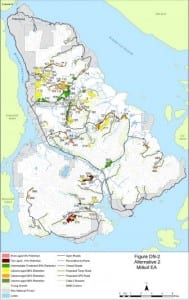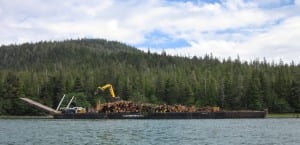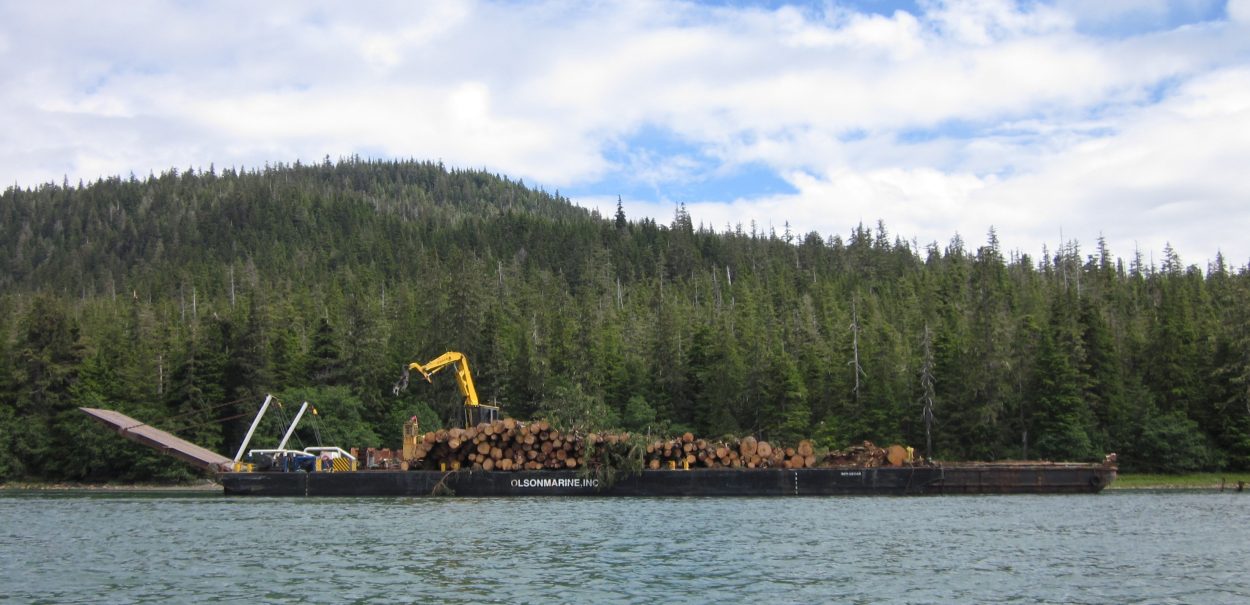The U.S. Forest Service and five environmental groups this month filed a court document signaling that agency’s intention to withdraw a decision on a timber sale on Mitkof Island near Petersburg. The groups sued the Forest Service to block that sale and are calling the planned withdrawal a victory for old growth forest and deer on Mitkof Island.
Audio Player
The Forest Service in March released an environmental assessment document and decision to offer timber on more than four thousand acres on Tongass National Forest land on the Mitkof Island road system south of Petersburg. That prompted a lawsuit this May filed by five environmental organizations. According to a court filing this month, the Forest Service informed the plaintiffs that the agency was planning to withdraw the decision to authorize the sale and asked for more time to complete that withdrawal.
“Mitkof has been really hard hit in recent years, and also with 60 years of industrial scale logging and that has impacted local hunters dramatically,” said Becky Knight of Petersburg, a board member with the Greater Southeast Alaska Conservation Community or GSACC. “Deer populations have suffered,” she said. “Impacts to other wildlife like the goshawk and wolf are a consideration. So we’re pretty happy about it.”
The other groups that sued over the sale are Cascadia Wildlands, Center for Biological Diversity, Greenpeace and the Alaska Wildlife Alliance.

A map of the planned timber harvest on Mitkof Island from the U.S. Forest Service’s March 2015 Environmental Assessment document for the project.
Mitkof Island’s two-week deer hunting season is open in mid -October. It remains one of the most restricted hunts in the region because of low deer numbers, impacted by habitat loss, predation by wolves, a growing moose population and several snowy winters. The groups challenged the timber sale arguing deer habitat would be further impacted by the planned logging and that subsistence hunters will have less of a chance to shoot a deer on the island.
Knight said the sale should not go forward. “35 million board feet is a large amount of old growth, and it was primarily old growth, to take off the island. Mitkof Island needs a long period of recovery not more logging.”

A log barge near Mitkof Island awaits logs brought by helicopter working on a University of Alaska Lands timber sale in 2014. (KFSK file photo)
The Forest Service’s plan initially was for timber sales totaling over 28 million board feet with a mixture of helicopter and conventional logging as well as some micro sales for small mills on the island. The helicopter logging volume has since been increased, bringing the total to nearly 35 million board feet. The plaintiffs argue that for the size of the timber harvest, the Forest Service should be forced to draft a more comprehensive review, called an Enviromental Impact Statement, instead of the smaller, and less intensive Environmental Assessment document released this year. The review is required for timber sales and other development on forest land under the National Environmental Policy Act. The Mitkof sale is the largest to be approved in the past two decades with an EA, instead of an EIS.
Alaska Forest Association board member George Woodbury of Wrangell said every sale is important to industry. He thinks the Forest Service will be drafting a future EIS for the sale in the future. He hopes that second review will take another look at how the timber will to be offered.
“There was some problems with the way the sale was offered and if they can use this re-assessment to improve the economics of the sale, it would be a benefit, as long as they get it done in a quick time,” Woodbury said. “Because we’re as always short on timber and need to get everything we can into the marketplace.”
The Forest Service’s review estimated the logging would create over 125 jobs and almost seven million dollars in income to those working on the sales. One local mill operator Everett Kissinger said he would have taken advantage of timber offered in the sale and calls it a missed opportunity. He notes that he mills such a small amount of wood that it probably won’t be a financial hardship to lose that opportunity. However, he thinks other local mill operators, builders and craftsmen also would have purchased some of that timber.
Agency spokesman Kent Cummins said this week the Forest Service has not finalized its withdrawal notice. He said “When that notice is completed and the court is informed, we may be available for comment.”
US District Judge Sharon Gleason Wednesday granted the plaintiffs’ and defendant’s request for more time to file briefs in the case and those are due in December and January. Once the withdrawal notice is completed the Forest Service expects the lawsuit to be dismissed and the two sides are expected to seek a quote “mutually acceptable resolution to this case.”











